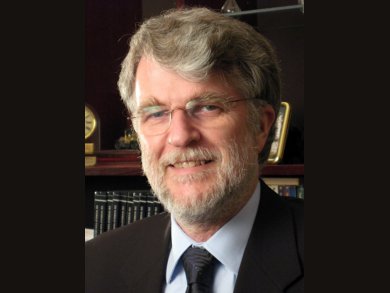Each month, ChemViews asks a chemist at the beginning of their career (Ben Davis, University of Oxford, UK) and an established chemist (Koop Lammertsma, below) to give their opinions on the future of chemistry.
Interview
Prof. Koop Lammertsma, VU University, Amsterdam, the Netherlands
1. What do you think is the biggest challenge facing the world?
This is a tough question. What I fear most is that the increasing population will put too much strain on our planet. We as a society are already increasingly focusing on alternative energy resources as the depleting conventional resources, such as oil and gas, are recognized to be insufficient to sustain our standards of living. This focus is appropriate but far from complete. What is worrisome, much more than conventional energy resources, is the worlds limitation in minerals. Unless a massive program is initiated to recycle minerals our world may be in deep trouble well within the time span of a century.
A simple example is the availability of the element phosphorus (from phosphate ore), which is of utmost importance as it is a crucial element in the life cycle. Without fertilizers — no food. Without food — no life. Peak Phosphorus will overshadow Peak Oil in about 2030 when the world population will have grown to 9 billion, from 3 billion in 1950. The scenarios are truly worrisome. A similar argument can be made for nitrogen and rare earth and noble metals. Element sustainability is the biggest challenge facing the world.
2. What role can chemistry play?
Besides the obvious waste water treatment to extract valuable nutrients and minerals, recycling of metals, and infrastructural changes are needed to prevent or eliminate any waste. Chemists can play a role in not only providing the technological know-how to improve these processes, but also to design far better chemical processes that are atom-efficient.
3. Which trends would you like to see develop? (What are your hopes for the future?)
It is desirable that our society starts to recognize that the Earth’s supplies are limited. If we are to sustain our projected population of 9 billion in 2030 with a meaningful existence, our consumptive behavior must be fully matched with sustainability. Such thinking will be a paradigm shift. No more waste. All must be recycled. This constituted a tremendous challenge and opportunity for the chemist.
4. Which trends would you like to see disappear? (What are your fears for the future?)
What I would like to see embedded in people’s minds is that there is a tremendous price on waste. For example, the depletion of phosphate fertilizers into the oceans depletes this element from the life cycle as it cannot be recovered. Gone is gone. There are no alternatives. For industrial processes the economics of the reaction protocols do not take such issues into account. But there is hope. The current focus on CO2 emission is a prime example that change is possible. A coherent universal approach on element sustainability is needed, one that is far overreaching the current debate on climate control.
5. Which invention(s) would you like to live to see?
There are many simple processes chemists and funding agencies can do. Shift the attention from the hot and popular issues to those that matter on the long run, which is to sustain crucial elements. For example, have chemists focus on reducing the phosphorus waste (as oxides) in the Wittig, Mitsunobu, and Staudinger reactions, eliminating the use of rare transition metals in catalysts in favor of iron, elaborating synthetic protocols by intelligent applications of multi-component reactions instead of waste-generating multi-step processes, to mention just a few.
6. What would you like to be doing ten years from now?
I have already decided to change my academic research program to offer solution for reducing phosphorus waste. The road is difficult, because of the dependence of academic groups on funding agencies and industrial relationships. The economics of phosphorus processes, dictated by the current supply and demand, does not take into account the future imminent shortage. This I take as a challenge to develop reactions that even in the current market structure will be of interest.
7. What advice would you give to up-and-coming scientists? (What was the best advice you have ever been given?)
My advice to the younger generation of chemists is to use their knowledge, creativity, and drive to change the current technology to one that is truly sustainable. Their children will be the direct benefactors. There is no time to lose.
Personal Record
Prof Koop Lammertsma
Professor of Organic Chemistry, Dept. of Chem. and Pharmacochem., VU University.
Koop Lammertsma got his MSc in 1974 from the University of Groningen, the Netherlands, and did his PhD (1975–1979) at the University of Amsterdam, the Netherlands, under the supervision of Hans Cerfontain. He spent three years as a postdoctoral fellow, working with Franz Sondheimerat, University College London, UK, for one year and with P. von R. Schleyer, University of Erlangen, Germany, for the remaining two.
Research interests: From synthetic methods to theretical studies, Koop Lammertsma’s interests focus on phosphorus in many forms.
In particular:
- developing and applying synthetic methods, reagents, building blocks, ligands, organometallic complexes, and catalysts that contain phosphorus,
- acquiring mechanistic understanding with computational chemistry to predict structures, stabilities, properties, and reactivities,
- developing organosilicates, and
- theoretical studies on the functions of metalloenzymes.
-
Read other Future Visions interviews >>>
-
Read Koop Lammertsma’s Author Profile in Angewandte Chemie >>>




